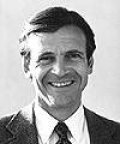
 |
|
|
|
|
|||||
|
History Of Frank Lorenzo |
|||||
 |
Frank Lorenzo was chairman, president and chief executive
officer of Texas Air Corporation. He was also chairman, president and
chief executive officer of Continental Airlines, and chairman of Eastern
Air Lines. Lorenzo is a graduate of
With the passing of the
Airline Deregulation Act of
1978 airline carriers were provided with new freedoms to expand
their route systems and the flexibility to develop innovative pricing
structures. This flexibility allowed the carrier to further grow into
new markets. However, deregulation brought about many unwanted hostile
takeovers and mergers. The move was on by many airlines to become giants
in the industry. Either be taken over or take over other air carriers.
Unions were being busted to cut personnel payrolls to increase profits.
Non-union carriers like People Express
triggered airfare wars which cost the airline industry close to a 100
million dollars. |
||||
This move made Texas Airline one of the biggest airlines in
the country. The move by Lorenzo forced the merger of many air
carriers in order to remain viable. Air carriers could not compete
with current airfares unless they merged with other carriers. TWA
acquired Ozark, Delta Airlines acquired Western Airlines and
Northwest acquired Republic Airlines.
|
|||||
|
Lorenzo was not satisfied. Driven by profits, Lorenzo
requested machinists of Eastern Airlines to take a pay cut. However, the
machinist union refused to do so. This brought about a war between labor
and management. The machinist union IAM (International Association of
Machinist and Aerospace Workers) called for a strike. The strike brought
about air passenger delay and the company began loosing millions in
daily revenues. The United States Bankruptcy Court intervened after a
creditor brought suit against Eastern Airlines. The court very much
aware of Lorenzo's labor practice, appointed Martin Shugrue as temporary
trustee over Eastern. Eastern was unable to overcome its fiscal downfall
and as a result was forced to close its door. Many had accused Lorenzo
of selling off assets and transferring Eastern's aircrafts to Texas
Air. Other accusations included depleting Eastern's pension
fund. Many felt Lorenzo was only interested in purchasing defunct air
carriers in order to strip the carriers of its assets. This was a major
blow to Lorenzo's credibility in the business community. In the summer
of 1991, Lorenzo sold off most of his investments with Continental
Airlines. This allowed Continental to further grow as a result of IAM
and other unions had kick up a storm.
The Scandinavian airline that bought Continental
also insisted that Lorenzo leave, and signed a pact to stay out of
the airline business for seven years. But that didn't stop Lorenzo
from trying to start up another small airline in
|
| ŠAvStop Online Magazine Contact Us Return To News |